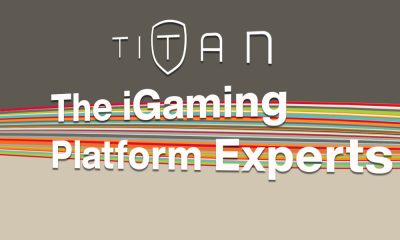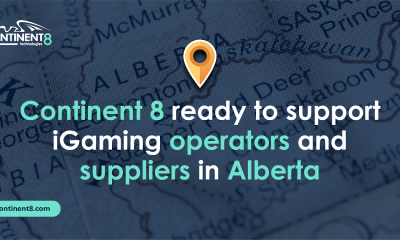Canada
Could PAM be the key to the US opportunity?

The US holds untold potential as it steadily regulates and many believe that an advanced, smart Player Account Management (PAM) system should be a priority for operators wishing to reap those rewards.
Gaming Americas spoke to four of the industry’s premier PAM professionals to find out what operators should be on the lookout for.
- Tsachi Maimon, CEO, Aspire Global (TS)
- Rob Fell, White Hat Gaming, COO (RF)
- Brandon Walker, Business Development Manager, Amelco (BW)
- Chris Looney, Chief Commercial Officer at Bragg Gaming Group and ORYX Gaming (CL)
As the US becomes more regulated, what advantages does a Player Account Management (PAM) system offer?
TS: The US is growing rapidly and nobody wants to be late to the party. Right now, operators are in a huge rush to go with any available product that is ready-for-market, and some are taking the M&A route to solve this issue. We recently saw that DraftKings acquired BlueRibbon for the jackpot product they developed, as well as Bally’s tabling a bid for Gamesys to improve its digital platform capabilities. However, most operators do not have a budget to acquire products and instead need to lean on third-party providers to build their business.
Rather than going down a similar route of acquiring technology layer by layer, the advantages of using a PAM solution are clear. The operator can differentiate within CRM and segment players for superior engagement. In addition, each US state has differing regulatory requirements. If you are building infrastructure for an individual state, that means you need to repeat that process time and time again. Our PAM system offers a single infrastructure that can be rolled out quickly, for fast, seamless entry into multiple states. We call this a ‘state in a box’.
BW: A PAM system should be the engine that powers the full solution and does exactly what it says on the tin. At Amelco, we’re able to deliver a full-service ecosystem for gaming that combines all verticals (eSports, Sportsbook, Casino etc) powered by our own PAM, which offers multiple components that take the customer through the full journey.
The ability to offer this is especially key in the US – where a full PAM system is a necessity for delivering a 360-degree offering in what is, in effect, only recently online territory. A 360 offering can help an operator stand out and not all leading sportsbook suppliers have this, and they’ve certainly felt the impact.
The wallet element of the PAM system is the real differentiator, and the more dynamic your customer journey is, the more your offering will resonate with a modern American player that expects speed and convenience. At the end of the day, solid foundations are the name of the game in the US, and having a powerful PAM effectively reduces the need for an operator to create a dedicated department. Coupling that with the retention numbers the solution provides is a recipe for success.
RF: A single instance of PAM back office or administration for the operator allows for the viewing of revenue reports, player behaviour and analytics, configure CRM, define segmentation and set bonus programmes in place. This is a clear advantage and allows for the management of sports, casinos and more in an incredibly lean and efficient way.
A successful PAM provider offers rapid, in-house integration of content alongside features such as a product-wide bonus system, integrated and capable CRM and a tightly integrated Data Warehouse solution. Crucially as more states open up, built-in compliance parameters which can be easily configured for each jurisdiction are a must. A system that offers an efficient player acquisition and retention options are also beneficial as operators scramble to gain market share in new territories.
The winners will be those B2B providers that can offer full-stack solutions, meaning the possibility to handle both back-end and front-end services. Full-stack solutions are better integrated and provide a service that is much better received by end-users. Through our growing stable of brands, technology and content including the ORYX PAM and player engagement features, at Bragg we offer the lot.
CL: A successful PAM provider offers rapid, in-house integration of content alongside features such as a product-wide bonus system, integrated and capable CRM and a tightly integrated Data Warehouse solution. Crucially as more states open up, built-in compliance parameters which can be easily configured for each jurisdiction are a must. A system which offers an efficient player acquisition and retention options are also beneficial as operators scramble to gain market share in new territories.
The winners will be those B2B providers that can offer full-stack solutions, meaning the possibility to handle both back-end and front-end services. Full-stack solutions are better integrated and provide a service which is much better received by end-users. Through our growing stable of brands, technology and content including the ORYX PAM and player engagement features, at Bragg we offer the lot.
What PAM features are going to be important to operators as the US market evolves? How will these be implemented?
RF: Both generic, such as player protection features, and state-specific RG and reporting functionality will be key. To succeed and to keep up with the expected pace of states going live, these modules need to be flexible to keep up with new requirements, but also scalable so they can work across the platform, varying states and customer needs.
For some PAMs like White Hat Gaming, this is based on learnings taken from work that has been done for the EU regulated markets and this will really help especially as it’s expected that some states will follow the UK’s lead. The second part is a tight integration of land-based offerings. This will mean that payment integrations with machines, cages and also API to proprietary loyalty schemes will become increasingly important to optimising cross-sell in both directions.
Obviously, there are other features, such as fully integrated bonus tools and intuitive marketing campaign segmentation and orchestration, that should be tightly coupled to the PAM.
TS: There are three key elements within a strong, successful PAM. First, it provides the ability to connect a player wallet to many integrations – everything from payments to content providers and KYC. Second, there is the creation of automated funnels for onboarding players, collecting documentation and creating scalability for the operator. Third, it is the ability to programme advanced CRM and promotional tools and to then communicate these through many different channels. All of this comes together to create higher player value for the operator.
It is also true that in the US as with other markets, the PAM alone is not enough. We approach operators with our full package of sportsbook and casino products and services, including managed services, in order to appeal to land-based businesses in the US that want to move online.
CL: Responsible gaming products are paramount for all stakeholders, both to fulfil responsibility requirements and guarantee business sustainability. We have already started seeing a shift from traditional responsible gaming tools such as self-exclusion, reality checks and spending limits, to more advanced solutions capable of detecting and preventing addiction. Responsible gaming is more important than ever and identifying and preventing harmful behaviour is a priority for all.
We also expect that player engagement tools will be key in the US and, given the existing interest in social and gamification features, familiarity and demand will be high.
PAM suppliers with experience in land-based and omni-channel solutions will also have an advantage. Mobile is king, but an understanding of retail solutions and methods of delivery through various channels could make the difference.
BW: There’s one main gamechanger – KYC, and, in particular, the ability to offer single logins across multiple states. To put this in perspective, as it stands for many, old-school operators need their customers to download a new app each time they cross state lines, which is a real headache. Removing this obstacle is going to be essential for many when it comes to scale.
The way I see it, it’s all about creating solutions that are unique to the US market, and these need to suit the completely new dynamic that the US presents. Such KYC-based features need to offer a solution that makes it as easy to get involved in the action as soon as possible. Each additional minute lost during the sign-up process effectively means a loss of initial retention. Of course, that’s starting to change now, with the likes of Iowa’s elimination of the need for players to initially register on-site with a casino sportsbook being a good example. Of course, a solid bonus engine is also crucial to what the PAM can offer.
Scalability will be important in such a fluid environment, what challenges does this pose in the development of a PAM offering and how can those be overcome?
CL: The US market is expected to bring a very high number of players/transactions, which will require the platforms to have powerful and scalable solutions capable of coping with the traffic. It will be essential for suppliers to ensure the very lowest downtime and the fastest disaster recovery times. The US market will demand the highest standards and the penalties will be high, so providers must be on top of this.
TS: Features that are crucial to scalability include automation, the seamless onboarding of the customer and cash-out options. In the mass market, with so many players involved, it is crucial that manual processes are removed from the equation in order to grow.
I believe the high double-digit growth we have seen in the existing US states will continue for the next few years. Back in Europe, the first regulated markets grew dramatically in the beginning, but experience dictates that after that initial period, US regulators will re-assess the situation and that could have an adverse impact on limiting operator growth, effectively stabilising the market.
RF: Scalability in this sense to us isn’t just about being able to cope with traffic for the Super Bowl or the Kentucky Derby, it’s about quickly being able to scale across multiple states, adding multiple clients, supporting multi-app and product strategy while offering single instances of back office, CRM and bonus tools.
Trying to retrofit this scalability to old tech stacks is challenging so PAMs that have been developed from scratch with this in mind will overcome this type of scaling issue much more effectively.
BW: It’s all about single login and a single app. Operators need to be able to scale across multiple states, which means a hub-and-spoke architecture design that can enable a singular HUB to power spokes across numerous jurisdictions via one app. This is not yet mainstream in the US, but this is what operators need to start doing if they want to lay claim to a national presence.
The design, look and feel of such an app is also essential – and we need to remember this is one of the world’s most discerning markets for customer UX when it comes to entertainment. This means the ability to offer differentiators is key, such as bonus campaigns with interchangeable widgets – all embedded with casino – removing any need for a separate casino app, and potentially a further loss of retention.
Powered by WPeMatico
Alex Malchenko
Evoplay Strengthens Canadian Presence with BetMGM Partnership

Evoplay is celebrating another milestone in its regulated-market journey with a new launch in Ontario, teaming up with BetMGM to bring its games to one of Canada’s most dynamic and competitive jurisdictions.
The rollout introduces 18 Evoplay titles to BetMGM Casino in Ontario, carefully selected to deliver long-term engagement and appeal to a wide range of player preferences. The first wave includes proven performers such as:
• Hot Triple Sevens
• Hot Volcano
• Gold of Sirens Bonus Buy
• Inner Fire Bonus Buy.
These are games that have already demonstrated strong results across multiple regulated markets.
This launch marks another confident step in Evoplay’s Canadian expansion, reinforcing the company’s commitment to aligning its content with local market requirements, player expectations, and regulatory standards.
Alex Malchenko, Head of Sales at Evoplay, said: Ontario continues to set a high standard for regulated online casinos, making it a market where the right partnerships truly matter. Collaborating with BetMGM allows us to expand our reach with a portfolio that has already performed strongly across multiple areas and territories.
Oliver Bartlett, VP of Gaming at BetMGM, said: “Partnering with Evoplay adds a strong selection of proven, high-performing titles to our growing portfolio in Ontario.”
The post Evoplay Strengthens Canadian Presence with BetMGM Partnership appeared first on Americas iGaming & Sports Betting News.
Bet Rite
Spintec Expands into Canada with Bet Rite

Spintec is expanding its footprint in North America by partnering with Bet Rite in the Canadian gambling sector. As a prominent developer of electronic table games, Spintec invested significant effort into locating a partner who comprehends the distinctiveness of the Canadian casino industry. Bet Rite is taking on the position of Spintec’s distributor in Canada, leveraging its established reputation and substantial industry knowledge. This collaboration combines global innovation with local expertise in a partnership that is helping Spintec advance its expansion objectives in North America.
Bet Rite’s establishment is rooted in years of industry expertise. The firm focuses on providing top-notch gaming solutions designed specifically for Canadian operators. They aim to provide a sole vendor connection that grants access to numerous top-tier product lines, establishing them as a reliable partner nationwide.
For Spintec, collaborating with a company that prioritizes service, product excellence, and enduring relationships is vital, and Bet Rite is dedicated to prioritizing customer needs. With a solid sales network and a reputation for dependability, their market stance is highly strong.
Through this collaboration, Spintec is guaranteeing that their creative products receive backing from an attentive, community-focused service. The initial product line to be launched in the Canadian market will be Spintec’s premier Charisma line. Charisma’s design, flexibility, innovation, and wide range of product customizations will undoubtedly make it a top seller in Canada as well.
Billy Maclellan, Bet Rite President, says: “Our company has grown by offering best-in-class suppliers the local support that they need. Spintec fits the mold perfectly and together we are well placed to make this partnership a glowing success”
Goran Sovilj, Spintec’s Chief Commercial Officer, agrees: “Bet Rite’s deep understanding of the Canadian market makes this alliance very promising. We are always excited to introduce innovative and exciting products to new markets, especially when our distributors are as experienced and knowledgeable as Bet Rite.”
The post Spintec Expands into Canada with Bet Rite appeared first on Eastern European Gaming | Global iGaming & Tech Intelligence Hub.
Canada
Gaming Corps takes flight in Ontario with High Flyer Casino partnership

Gaming Corps, the Sweden-based publicly listed game development studio, has secured a new content partnership with High Flyer Casino, an AGCO-licensed online gaming operator in Ontario, Canada. The agreement marks another strategic step forward for Gaming Corps as it continues to grow its footprint in one of North America’s most competitive regulated iGaming markets.
As part of the deal, a curated selection of Gaming Corps’ slot titles will be made available to High Flyer Casino players across Ontario. The initial launch includes 3 Pigs of the Caribbean, a swashbuckling instalment from the well-known 3 Pigs franchise, alongside Savannah Stacks, a high-volatility slot inspired by the thrills of a safari adventure.
High Flyer Casino has established itself as a slots-focused operator with a strong reputation for value-driven, mobile-first gaming experiences tailored to Canadian players. Operated by Ellipse Entertainment Limited, the company draws on more than 25 years of industry expertise and offers a diverse portfolio that features over 100 exclusive games. Its offering is further enhanced by the proprietary Reel Jackpot brand, popular Money Spinner titles, and a wide range of progressive slots.
Commenting on the partnership, Adam Pentecost, Chief Revenue Officer at Gaming Corps, said:
“High Flyer Casino has carved out a clear position in Ontario with a focused slots strategy and a strong understanding of what local players are looking for. Bringing our most recognisable titles to their platform allows us to reach a highly engaged audience in a market that continues to set the pace in North America. This agreement represents another meaningful step in expanding our distribution with operators who value distinctive content and long-term portfolio growth.”
Man Mac, Head of Marketing at High Flyer Casino, added:
“At High Flyer Casino, we are building a slot lineup that blends proven player appeal with unique and memorable gaming experiences. Gaming Corps’ portfolio fits perfectly with that approach, delivering polished, entertaining games that are full of personality.”
The post Gaming Corps takes flight in Ontario with High Flyer Casino partnership appeared first on Eastern European Gaming | Global iGaming & Tech Intelligence Hub.
-

 Edvardas Sadovskis CPO at ICONIC217 days ago
Edvardas Sadovskis CPO at ICONIC217 days agoICONIC21 Reimagines Myth: Medusa vs. Perseus — The Stone Duel
-

 Canada7 days ago
Canada7 days agoGaming Corps takes flight in Ontario with High Flyer Casino partnership
-

 Africa7 days ago
Africa7 days agoAmusnet Announces Strategic Partnership with Betway
-

 CRM6 days ago
CRM6 days agoTitan 3.0 Launch Marks Finnplay’s Biggest Platform Overhaul
-

 Christer Fahlstedt6 days ago
Christer Fahlstedt6 days agoPaf has halved its loss limit since 2018
-

 Canada7 days ago
Canada7 days agoCasinoCanada and GG.BET Forge Strategic Alliance
-

 Latest News5 days ago
Latest News5 days agoWinSpirit’s UnValentine’s Day: A New Take on February Engagement
-

 AGLC7 days ago
AGLC7 days agoContinent 8 set to back Alberta’s iGaming operators and suppliers

















